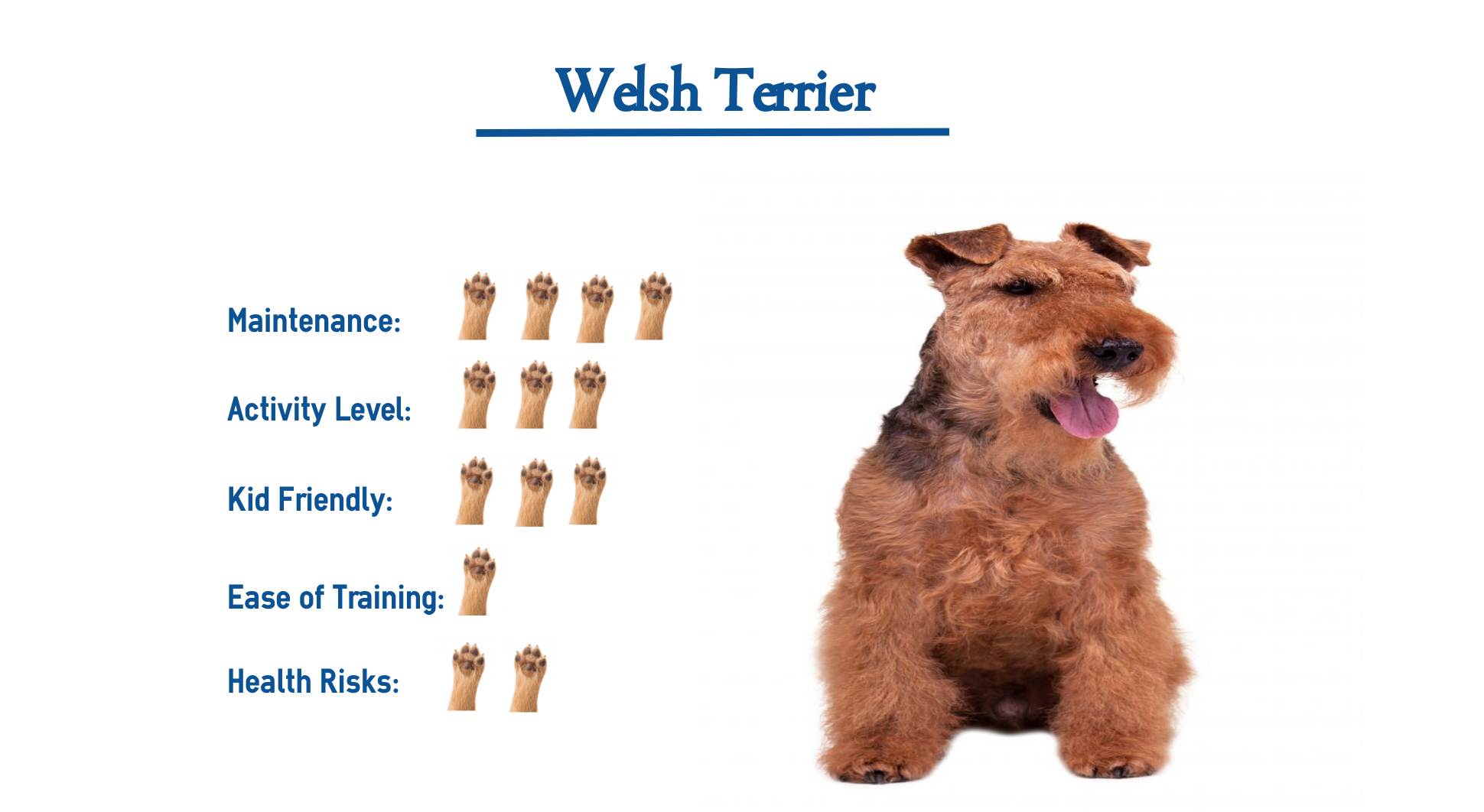Are you looking for a new family dog for a pet and considering a Welsh Terrier? This sturdy breed is one well worth inviting into your family. However, like people, all dogs have different personalities, and species play a part. So, before you get a Welsh terrier dog breed, you should know as much as you can about their behavior, physical characteristics, and health. This will help you know exactly what you’re getting into before you do.
Because…
The last thing you want to do is take home one of these awesome little guys only to learn a few weeks later that what makes a Welsh Terrier great is the same thing that makes you crazy! But don’t fret because this is why we here at IndulgeYourPet decided to write this article so that you won’t find yourself in such as predicament. So, without further ado, let’s dive right in!
Welsh Terrier Fast Facts
Country of Origin: United Kingdom/ Wales
Original Purpose: Small game hunters
Height: 12 to 16 inches at the shoulder
Weight: 18 to 24 pounds
Dog Breed Classification: Terrier group
Lifespan: 10-15 years
Origin of the Welsh Terrier Dog Breed
You can find this dog in many old paintings from the UK, particularly its exact home: Wales. Here, Welshies always fought badgers, foxes, and other small animals. But, by 1884, the dog became a famous show dog. And while they have been around the UK for several hundred years, they didn’t “officially” appear in America until the late 1800s when a guy named Prescott Lawrence brought them.
From there…
It was only a short while until the American Kennel Club (AKC) quickly recognized them, so they’ve been part of the AKC for more than 130 years. By 1900, the Welsh Terrier Club of America was formed to ensure this breed would remain immensely popular in the United States for many years.
Alternate Names used to describe the Welsh Terrier dog breed
This dog goes by a bunch of nicknames, including:
- Old English Terrier
- Rough Coated Terrier
- Black Haired Terrier
- Old English Wire Haired Terrier
Personality and Temperament
This is a dog, a firecracker of a personality. If you want a calm couch potato kind of dog, let it be known this is not the dog for you! However, this is probably worth considering if you want a dog that gets you off the couch and active. If you have small pets like cats or rabbits, this dog may unintentionally be a little too rough with them. Beware of play time that scares the other animal. We recommend you limit any playtime and don’t leave the two alone.
Training Welshie puppies…
They can and probably should start when they are two months old. If you wait beyond that time, it will be tough to train this dog. Owners who don’t qualify early will regret it! Training will be essential if you want them to coexist with other dogs and humans.
Characteristics:
This dog looks very similar to an Airedale Terrier but is distinctly different. The main differences are that this dog has a much more compact body, and the fur is a wiry texture. Their hair is usually curly, which isn’t all that difficult to care for. Other noticeable features of this dog include the following:
- Bushy eyebrows
- A boxy or square-shaped face
- Distinct muzzle
- Triangular ears
- Black and tan coloring
As a medium-sized dog, you’ll need at least a 30” inch crate for this dog.
Potential Health Concerns
Every breed of dog (and mutt) can get sick. Of course, there are some measures you can take to limit the “amount” of things your dog is predisposed to. The main thing is to ensure you get your dog from a breeder who has bred the dog with concern.
These “kinds” of breeders…
They will typically do everything they can to eliminate some of the medical risks a particular breed could be prone to having. You can also ask for health certifications and family information.
Some of the things you may have to worry about with a Welsh Terrier are:
- Hypothyroidism – could need lifelong medication or even radiation
- Eye problems – welsh terriers are prone to dry eye, cataracts, and lens luxation
- Allergies – environmental, food, etc
- Patellar Luxation – this is a knee cap condition that could require surgery
But remember…
As we stated before, it’s essential to know that dogs can get diseases even if they aren’t genetically predisposed. They can contract things, have accidents, and so on. The truth is, just like humans, dogs get sick, and sometimes there’s no real explanation as to why – or even if there is, there’s not much you could have done to prevent it.
And while many conditions that can arise when you adopt a Welsh Terrier puppy may not be life-threatening, they can become quite expensive to deal with, particularly if they become recurring issues. This is why we here at IndulgeYourPet also recommend that any new pet owner take a moment and see what it might cost for you to purchase a pet insurance policy for your new animal.
Now will a pet insurance policy be suitable for everyone?
No, probably not. But until you fully understand what these policies “will” and “won’t” cover and how much these pet insurance policies cost, how will you know if one might be right for you?
For more information on who we feel currently offers the “best” pet insurance policies out there, we would encourage you to check out our Best Pet Insurance Policies article.



